Dr. Sharon Malone, a prominent figure in the field of women’s health, has been labeled as a “steadying force” in the life of former First Lady Michelle Obama. For over three decades, Dr. Malone has practiced as an Ob/Gyn in Washington, D.C., and has gained recognition not only for her professional expertise but also for her strong personal connection with women navigating the complexities of menopause. Her advocacy is crucial, especially as societal stigmas often surround discussions on women’s health issues. In a climate where many women suffer in silence, Dr. Malone’s resolve aims to change the narrative and facilitate open discussions about menopause.
Dr. Malone’s friendship with Michelle Obama has played a pivotal role in bringing menopause to the forefront of public conversation. In a recent interview, she highlighted how influential Obama’s willingness to share her experiences with menopausal symptoms has encouraged discussions that were once considered taboo. The cultural shift prompted by such high-profile openness cannot be underestimated. When prominent figures speak candidly about their health challenges, it shatters stigmas and opens doors for women everywhere to seek help and find common ground.
Dr. Malone’s insights extend beyond personal friendships; they reach the masses through platforms like the podcast hosted by Michelle Obama, titled “The Light.” Dr. Malone has become a trusted resource for Oprah Winfrey, further solidifying her role as a key voice in the discourse surrounding menopause.
Today, Dr. Malone serves as the Chief Medical Advisor at Alloy, a digital platform designed to provide women with accessible menopause information and healthcare. Through Alloy, Dr. Malone is committed to ensuring that every woman has the knowledge and resources to manage her menopausal journey effectively. Her emphasis on accessibility and empowerment aligns with a broader movement to destigmatize menopause. Dr. Malone’s assertion that women should not have to suffer in silence resonates deeply, particularly as she calls for a collective approach to managing perimenopause and menopause.
During her work with Alloy, Dr. Malone acknowledges the obstacles many women face in finding adequate care. She points out that doctors who have not recently specialized in women’s health may lack knowledge about perimenopause symptoms, leading to misdiagnosis or inadequate treatment options. This gap in understanding emphasizes the urgent need for resources and education in both clinical settings and the general populace.
One of Dr. Malone’s core messages is that menopause should not be viewed as a “curse” or a decline in femininity but rather as a natural phase in a woman’s life worthy of respect and acknowledgment. Misconceptions surrounding menopausal symptoms persist, often leading to unnecessary suffering among women. Symptoms like mood swings, hot flashes, and even joint pain can go unrecognized and untreated, causing confusion and frustration.
Dr. Malone emphasizes the need for women to self-diagnose when presenting symptoms that may indicate perimenopause. She notes that even if a woman is still menstruating, she could be experiencing perimenopause based on her age. The clarity of her guidance provides significant validation for women who may otherwise feel unheard or dismissed during visits with healthcare providers.
Dr. Malone is a passionate advocate for hormone therapy, which she believes can significantly alleviate menopausal symptoms when prescribed correctly. Many women harbor misconceptions about hormone therapy, fearing potential risks. Dr. Malone clarifies that only a few absolute contraindications exist, which may deter women from seeking this form of treatment. Additionally, she strongly encourages women to explore hormone therapy and asserts that, under appropriate circumstances, it can greatly improve quality of life.
Encouraging women to initiate conversations about their health, Dr. Malone reminds them that facing menopause does not equate to a life diminished. Instead, with proper information and support, this stage of life can be embraced positively. Dr. Malone’s message is clear: there should be no stigma around seeking the right resources and treatments for menopause.
Dr. Sharon Malone’s passionate advocacy for menopause awareness embodies a significant shift in how society perceives women’s health issues. By fostering open dialogue and promoting access to reliable information, she is not only empowering individual women but also championing a broader cultural change. Women should feel encouraged to embrace this phase of their lives, armed with knowledge, support, and the confidence to seek care. In doing so, they break the cycle of silence, allowing future generations to approach menopause without fear or misinformation.

